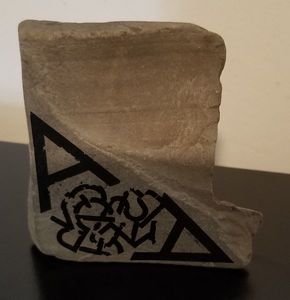Kitchen Table Poetics: A Love Letter to My Ride or Die
Here I am writing to you today again in isolation. It’s going to be hard to not have every post start like this: a pining, a reaching out. Today I have felt less alone than others; my Italian Catholic family all got together over video chat for Good Friday to make our traditional cookies and it felt—in the hectic, overwhelming, icing-covered way—almost like we were all together. Almost. It felt nice, too, to start the day with the lovely domesticity of baking and cleaning and eating and sharing. It felt nice not to have to work, these days when writing, too (perhaps especially) feels like work. I felt those two worlds—the thinking, writing, working world and the making, touching, feeling, domestic world—were very separate.
And I have to catch myself, stop myself from reifying that divide, and to remember that the division between the active world of work and the passive world of domesticity is a clearly gendered divide. That divide has historically invalidated women’s work. Trust me, if you’ve ever been in a video chat with something like fifty (okay, fifteen) Italian and Irish Catholics all trying to figure out how to bake cookies and use filters … damn, that feels like work. But what does this have to do with poetry?
All of that was preamble to say that today I’m honouring my ride or die with this post. I’m writing a love letter to my first true poetry love, the incomparable Kate Siklosi.
Kate does a lot of things for my writing, publishing, and scholarly practice. It would be impossible to write about it all. She reminds me of the importance of fragility, of community, of citation as activist praxis, of the blind spots in my utopian egalitarianism, of how to listen for the voices that are getting left out of conversations, and, more importantly, that we must listen for those voices. But one of the most significant effects she’s had on my scholarship and my poetics is reminding me that the aesthetic and the praxis of things labelled domestic (or crafts, or housework, or frivolous, or cute) can and often do have the philosophical complexity of more serious artistic endeavours. And when we forget that, when we dismiss these practices as frivolous we continue the long history of silencing women’s voices, voice of colour, disabled voices, and working class voices. We dismiss that work as not rigorous, not serious, not thoughtful. And I truly believe that no work can be radical if it continues to silences those voices and those frivolous practices.
My nostalgic turn back to the typewriter in OO ran the risk of trending towards the same high conceptualism of the serious vanguard. It began that way, too. It started to trace a legacy of typewriter use in visual and concrete poetry that reveal a patrilineal tradition. As I write this, I look down at my arm where two typewriter pieces are tattooed onto my skin: bpNichol’s “Blues” and a typewritten score for John Cage’s “4:33.” They’re not the worst kind of father figures; they are politically sound and prioritize affect and are interested in queering and opening and expanding these artistic practices. But, they are daddies nonetheless. So, with Kate’s insistent voice in my head, I opened the project to craft, to affect, to frivolous teenage pink, and to the femme voice inside me (and inside my typewriters). And I let those bitches out.
Kate’s work (poetic and scholarly, home and away) has always been informed by domesticity as serious work, in craft as art. Her work is always engaging in both sides of that conversation. I’m including here, sharing for the first time I think, an image of a Letraset poem on a piece of shale that Kate gave to me years ago. I am tempted to describe her work here as walking a line or negotiating a tension, but, no, those aren’t the right phrases.
Kate’s work here (does this poem have a name? should it?) embodies both sides at once. It has to be both things, to hold the contradiction in your hands and be okay with it. It’s craft and it’s the most beautiful kind of museum-bitch high art. It’s strong and tough and it’s fragile and soft (and so, so smooth). It’s cute and kitschy and it’s asking the same poetic theory questions we worked through as we completed our PhDs. It’s both. It has to be both at once.
Kate appears in OO in the form of a transcript of a conversation we had together printed as an afterword. It serves as a kind of poetics piece, a meditation on the larger ideas I am working with throughout the poems. The conversation with Kate wasn’t even my idea. It was Gary Barwin’s, who suggested I add actual conversation between actual wimmins in a book about feminist poetics as conversation. When I suggested it to Kate, she was immediately game and required no preparation. I just showed up days later in her kitchen with some wine, some weed, and some snacks and I turned on the recorder and we started talking. It felt organic and, for the most part, felt just like how we would have been talking anyway. But, we also articulated and worked through some of the issues that changed how I formatted OO, how I approached my newest poetry project, and how I’ve approached my scholarly work since.
Our best philosophical and poetic ideas came out of that kitchen; our best publishing ideas, our best book-binding, our best titles. And, I think that the kitchen as a site of creation and discussion is pivotal to my work in OO and going forward. So, my windowsill herb garden and my kombucha brewing and the raisin bread still rising on the counter as a type … these things aren’t art for me, but the patience, the care, the experimentation involved in them are central to my artistic practice. I cannot separate that care, that growth, the radical alteration of the fermentation, or the matrilineal voice of my Nonni Angelotti, my Nonna Nancy, and my mother, Marie, whose handwritings and caretakings have brought me to this work. Kitchen writing, kitchen thinking. The kitchen table as a site of radical creation. And, a refusal to pretend that that table is separate from my desk at all.
Kate’s since moved to a new place, and I think back fondly to that kitchen as a site of a lot of serious work, a lot of frivolous work, and an inability to draw a line between them.
Your CanLit News
Subscribe to Open Book’s newsletter to get local book events, literary content, writing tips, and more in your inbox
The views expressed in the Writer-in-Residence blogs are those held by the authors and do not necessarily reflect the views of Open Book.




